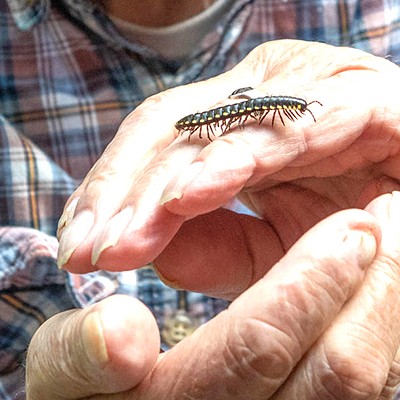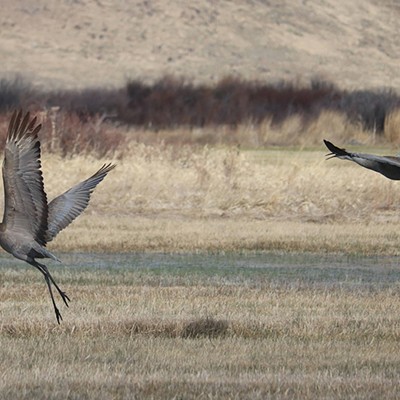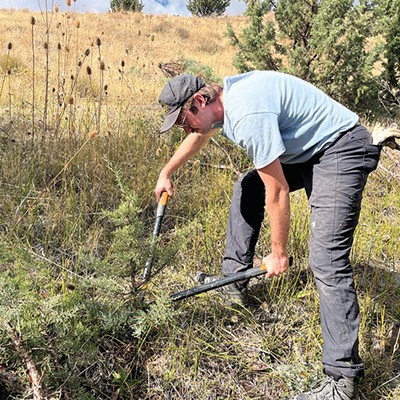There I was, just getting into my old 4-Runner after dropping off some French chocolate to my dear old pal, Fetty, at her place near Cascade Estates, when I felt something touch my left finger. In spite of me pushin' 90, I still have pretty good tactile senses, so I knew it wasn't my imagination.
I looked at my left hand, but couldn't see anything, so I buckled up my seat belt, started that faithful old machine, put it in gear and started out of Fetty's driveway. Then I felt something crawling on my hand.
"What the heck," I said aloud and shut off the ignition, leaving the 4-Runner in gear, putting my hand right in front of my face and slowly turning it.
Son-of-a-gun, as I was inspecting the back of my hand, I saw something dark on the inside of my ring ringer and turned my hand over. The "something" was a split second ahead of me and swiftly went to the other side of my finger. I turned it back and whatever the creature was darted out of sight again.
That's a true bug—and true bugs make a living by sucking fluids from their hosts. They have a mouth part that's truly hideous, a stabbing sucker that can pierce any skin the bug wants it to.
tweet this
We played that game of flip-flop another three times. I put an end to it by using the finger from my right hand to prevent whatever it was from scampering away from my line of sight. What you see in the photo included here is what came into focus in my Canon when I stopped the bug from running out of my line of sight.
That is not a creature you want running around on your finger, hand, arm or any part of your body. That's a true bug—and true bugs make a living by sucking fluids from their hosts. They have a mouth part that's truly hideous, a stabbing sucker that can pierce any skin the bug wants it to. Be it reptile, amphibian, mammal, corn stalk, tomato vine or elephant—depending on what the family and species—a true bug can pierce it.
It's an insect you can really call a "bug"—they all have an "x" on their backs—and I think this one is a "kissing bug." That doesn't mean it's in the least bit friendly, or romantic. It means it has a light touch when it pauses to stab its syringe-like device into your flesh.
However, like a mosquito when it's sucking your blood, the true bug is also pumping an anticoagulant into the hole at the same time, and among the chemicals it's giving you, there could be an ensuing infection that ain't pretty. Even the feces of some of these bugs carry bad stuff in the form of parasites. As far as I know, the worst infection one can get from a kissing bug is Chagas disease, a tropical parasite—but there may be others nastier.
OK, now that I've scared the daylights out of you, here comes the good news. The particular bug that carries that disease has not (apparently) been found north of the California border (yet). But with Central American butterflies showing up in Texas, New Mexico and Arizona, that could mean that other so-called tropical insects could also be coming north, and among them the kissing bugs.
So, when you head south to visit relatives, you go to a convention, an air show, or race a motorcycle, be aware of any dark, true bug-like insect—like that one above—coming to rest on your sweet body. They're not as noisy as mosquitoes, although they do make a musical sound while flying. Their touch is light—as you would expect for an animal that can inject its monstrous mouthpart into your flesh to suck your blood and pass on some of its chemicals.
Now you can do the health department (and yourself) a service. Should you be bitten/punctured by a true bug, don't smash it and brush it away. I know this sounds crazy, but please, capture it and put it in a plastic bag with your name, contact information, date, time and location.
Save it or ship it to me if you like and I'll pass it on to the proper health department, or you can drop it off at a county health department wherever you are. And by all means, tell your doctor what took place, especially if you're in Texas or the Southwest.
Sorry to ruin your day.


























